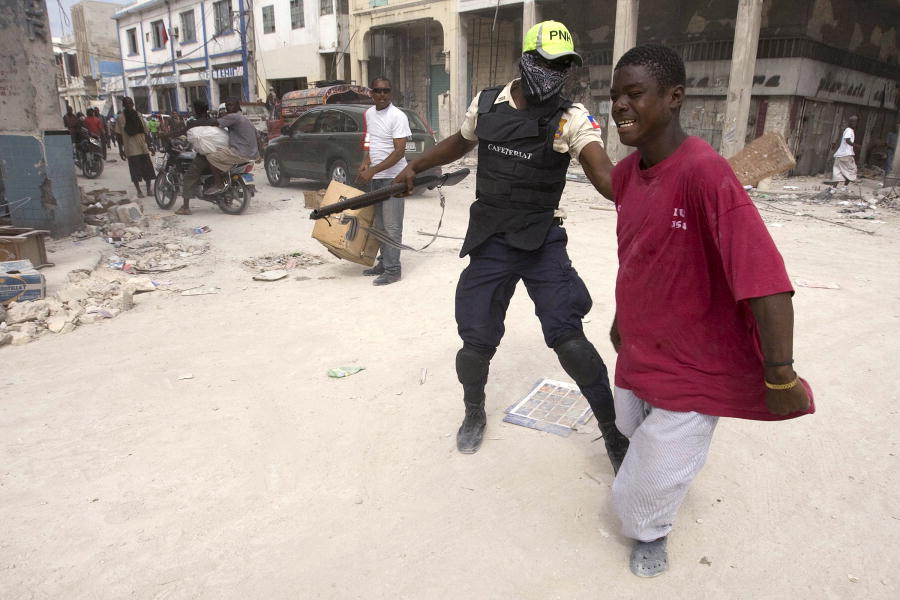WASHINGTON — While the United Nations Security Council has approved the deployment of a multinational security force to Haiti to crack down on rampant gang violence throughout the country, the mission — to be led by 1,000 Kenyan officers — faces roadblocks before troops can set foot on Haitian soil.
Those include division in the Kenyan government and a strong opposition movement from the Haitian diaspora.
In July 2022, violence spiked between rival gangs in Haiti’s capital of Port-au-Prince. The G9 and G-Pép gangs, backed by rival political parties, fought for control of the city. It was coined the “10 days of violence,” and more than 470 people were killed or went missing.
Prime Minister Ariel Henry then called upon the international community to deploy troops to aid Haitian law enforcement. Thousands more Haitians have been killed, kidnapped or injured since his appeal.
One year later, with the Security Council’s authorization secured, Haitians across the diaspora are protesting the intercession.
“The Haitian people have been in the streets demanding their sovereignty from foreign intervention for centuries,” said Jacqueline Luqman, an organizer for the Black Alliance for Peace, a human rights project that combats imperialism and says it has some 40 member organizations. “It’s not a police delegation; it’s an invasion.”
This sentiment isn’t just held by Haitians. Ekuru Aukot, a Kenyan lawyer and politician, filed a petition against the deployment, citing that it was unconstitutional. While the president commands the military, the troops deployed to Haiti wouldn’t be soldiers — they would be police officers.
Aukot argued that Kenyan President William Ruto cannot send police officers to another country without the approval of Parliament. In response, The High Court temporarily paused the deployment until Oct. 24 to further investigate the case.
Despite not being military, the police officers will come from an elite Kenyan force trained in counterterrorism, according to Vanda Felbab-Brown, a Brookings Institute expert on foreign policy.
“There is no entity within Haiti capable of quieting the situation or can fix the security situation. They’re between a rock and a hard place” Felbab-Brown said.
Currently, Haiti has no elected officials in office. Parliament members’ terms expired in January and the country was unable to hold new elections due to the escalating violence.
Prime Minister Henry, who is operating without a legislative body, was instated after the former president, Jovenel Moïse, was assassinated in 2021.
According to the U.N., part of the mission’s goal is to help rebuild a stable, democratic environment where they hold elections and have a functioning government. However, opinions are split on how realistic this is.
“Every day, we do not act is another day in which Haitians have to live in terror, fearing for their own safety and well-being,” Rep. Sheila Cherfilus-McCormick, D-Fla., the first Haitian-American elected to the Congress, said in a statement. “This resolution will ensure that the Haitian people get relief from the terror they have been facing.”
However, Felbab-Brown questions the sustainability of this mission.
“The force may quiet things down temporarily. But without addressing any of the larger structural issues, that will blow up the moment the troops are out,” she said.
One of the major issues with this intervention, according to Haitian activists, is that it doesn’t address the root of the violence and troubled economy — colonization.
After Haiti gained its freedom from France in 1804, the French government sent warships to the island. The military forced the Haitian government to agree to a debt of $150 million francs to secure their independence. This is equivalent to $20 to 30 billion today.
These funds went directly to slave owners and their descendants as reparations for losing Haitian slaves. The Haitian government did not have the capacity to pay these debts, which led to it taking out loans from American and French banks with high-interest rates.
It took more than a century for Haiti to pay off those debts, and caused Haiti anywhere from $21 to $115 billion in economic growth, according to a New York Times investigation.
“Look at what occupation has done to Haiti before,” Luqman said. “Get rid of foreign intervention. Allow Haitians to solve their problems internally and have sovereignty just like every European and Western country. That’s what Haiti and its people need.”
The High Court will hold another hearing on Oct. 24, in which Kenyan government officials will argue the claims filed by Aukot about deployment. The parties involved could settle privately, but if it goes to trial, the intervention could risk substantial delays.
“It’s important for the political process to move forward,” Felbab-Brown said. “There needs to be a broader empowering of civil society and a meaningful social contract where the state finally represents the wishes of the people.”



